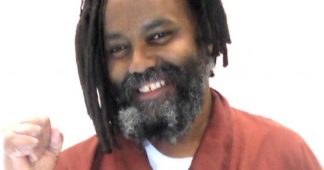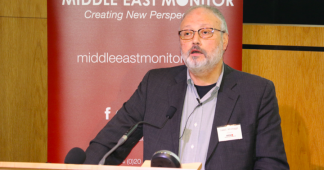By Fred Mazelis
5 January 2019
In a significant legal victory for Mumia Abu-Jamal, a ruling by a Pennsylvania Superior Court judge on December 27 gives the long-imprisoned activist and journalist a new chance to appeal his 1982 conviction for the murder of Philadelphia police officer Daniel Faulkner. Abu-Jamal, a former Black Panther who spent nearly 30 years on death row before prosecutors agreed in 2011 to a sentence of life imprisonment without parole, has steadfastly maintained his innocence.
Justice Leon Tucker issued a 37-page opinion last week that concluded, as reported by the Associated Press, that former Justice Ronald Castille of the Pennsylvania Supreme Court should have recused himself from a 2012 appeal rejecting Abu-Jamal’s final appeal. Tucker, pointing to numerous statements made by Castille when he was Philadelphia District Attorney between 1986 and 1991, advocating the death penalty in cases of killing of police officers, cited the “appearance of bias.”
At the same time, however, Tucker rejected other arguments presented by Abu-Jamal’s attorneys—that Castille had played a “significant” role, when he was DA, in the appeal of the original conviction, before going on to rule on the appeal as a judge.
Castille had received campaign contributions from the Philadelphia Fraternal Order of Police (FOP), which had loudly dismissed all claims that the defendant had not received a fair trial and had pushed for Abu-Jamal’s execution. Tucker relied on a US Supreme Court ruling in 2016 that Castille should have recused himself in a similar case. It was this decision that spurred the latest effort by Abu-Jamal’s attorneys. Tucker, in his opinion, said Abu-Jamal should be given another chance to argue his innocence in front of the state’s high court, now that Castille is no longer a sitting judge.
Abu-Jamal, now 63 years old, has spent well over half his life behind bars after his conviction and sentencing in the 37-year-old case, which Amnesty International, among numerous other advocates and observers, has charged was tainted by unfairness and racial bias.
A national and international campaign has been waged on behalf of Abu-Jamal, who became a focus of attention and opposition to the outrages that characterize the “criminal justice” system in the US, especially in the application of the death penalty. It was reinstated in 1976, part of the rapid shift to the right by the political and judicial authorities after the labor, civil rights and antiwar struggles of the 1960s and the defeat of US imperialism in Vietnam.
The original trial of Abu-Jamal took place in the early years of the Reagan administration, amid a law-and-order frenzy that would soon lead to the highest rate of mass incarceration in the world. Defense attorneys have brought forward evidence of many instances of flagrant misconduct in Abu-Jamal’s case, including an affidavit of a court stenographer that the trial judge in the case, Albert Sabo, had declared, “Yeah, I’m going to help ’em fry the nigger.” Sabo presided over a trial in which important eyewitness testimony was excluded, confessions were fabricated, and the defendant himself was excluded from most trial proceedings.
It was not until 2008 that Abu-Jamal’s original death sentence was thrown out, with an appeals court ruling that found that jury instructions in 1982 had been fundamentally flawed. Abu-Jamal remained on death row, however, after the US Supreme Court overturned the appeals court in 2010. Amidst continuing litigation, prosecutors finally agreed to reduce the penalty to the life sentence several years later.
During his long stretch of imprisonment, Abu-Jamal has continued to write as well as to speak on Prison Radio. He attracted attention with his 1995 book Live From Death Row. His latest book was published in 2017 and has a foreword by well-known journalist Chris Hedges.
Abu-Jamal has also suffered from severe health problems, exacerbated by neglect and inadequate treatment in prison. A recent “Democracy Now” radio program reported that he was diagnosed with hepatitis C and had obtained the necessary treatment only after a successful lawsuit.
The police union, prominently assisted by Maureen Faulkner, the widow of the slain officer, has kept up a vitriolic campaign against Abu-Jamal, and has received bipartisan support in this campaign from the political establishment in Pennsylvania. In 2014 the state legislature went so far as to pass a “revictimization” law, in response to a recorded commencement speech that Abu-Jamal had delivered at a Vermont college. The bill forbade prisoners, even in some cases those not yet convicted, from speaking or acting in ways that would “re-traumatize” victims of crimes. A state judge threw out the law in 2015 as “manifestly unconstitutional.”
Civil rights lawyer David Rudovsky, who worked on an early Abu-Jamal appeal, was quoted by the Associated Press on various elements of the Abu-Jamal case that point to ongoing police and prosecutorial wrongdoing and discrimination.
“The race bias, the judicial bias, the questions of identification and prosecutorial commentary or misconduct—we’re still struggling with them,” said Rudovsky, a University of Pennsylvania law professor.
Abu-Jamal’s attorneys have 30 days within which to file a notice of appeal to reargue his original conviction before the state’s highest court. At the same time, Philadelphia District Attorney Larry Krasner must make a decision on whether to appeal Judge Tucker’s decision. Krasner was elected in 2017 as a liberal, promising various criminal justice reforms. He has stopped requiring cash bail for most misdemeanors and nonviolent felony charges.











